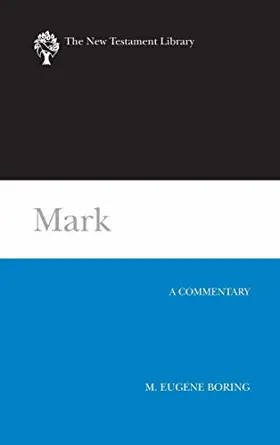

Mark
Pages
470
Publisher
Westminster John Knox
Published
1/1/2006
ISBN-13
9780664221072
Collections
This book appears in the following featured collections.
- Building an NT Commentary Library by Invitation to Biblical Interpretation (Kostenberger & Patterson)
- New Testament Commentaries & Monographs by Princeton Theological Seminary
Reviews
The first decade of the new millennium has already seen the publication of a number of commentaries on the Gospel of Mark (cf. those by C. A. Evans, 2001; T. J. Geddert, 2001; B. Witherington, 2001; N. T. Wright, 2001; J. R. Donahue and D. J. Harrington, 2002; J. R. Edwards, 2002; R. T. France, 2002; F. J. Moloney, 2002; C. S. Rodd, 2005; A. Y. Collins, 2007; J. Marcus, 2009—to name but a few, and only English-speaking ones at that!). Despite their prolificacy, Eugene Boring’s contribution to the genre, in the New Testament Library series, is a welcome addition. M. Eugene Boring is I. Wylie and Elizabeth M. Briscoe Professor Emeritus of New Testament at Brite Divinity School, Texas Christian University. A seasoned scholar with a substantial body of work behind him, he has written, inter alia, a significant commentary on the book of Revelation (in the Interpretation series, 1989, republished by Westminster John Knox, 2011), an influential treatment of Christian prophecy in the Synoptic tradition (Sayings of the Risen Lord, 1982), and numerous articles on various aspects of the Gospel of Mark.
[Full Review]
Dallas Theological Seminary Dallas, Texas The Gospel of Mark has been at the center of discussion in Jesus studies ever since the perception of it changed from being the Gospel with the least influence to being perceived as the first work of its type in the early church. A tension in its analysis has been the result. The debate is whether Mark’s role is an expression of the Evangelist’s creative, interpretive take of Jesus versus the Gospel’s potential function in giving us access to the historical Jesus. In a real sense, the debates about the historical Jesus versus the Christ of faith turn on how one reads this Gospel. The question is how wide Lessing’s ditch is. Some see less distance between these two ideas than others. M. Eugene Boring has written a commentary on Mark that focuses on the Evangelist’s take. He argues in a consistent and thoroughgoing way for some distance between these two images. In fact, if one desires a handy source for how the argument can be made for Mark presenting an apocalyptic take on Jesus that incorporates the messianic secret as well as the abiding tension between what Boring calls kenosis Christology and epiphany Christology, then this commentary is an excellent guide. Boring begins with an introduction that notes that Mark is the story of Jesus and the self-defining story of God (3).
[Full Review]

